【English·DT Excavation Whistleblower】The secret Behind TANG Juan

1. Analysis of the Houston Consulate Incident
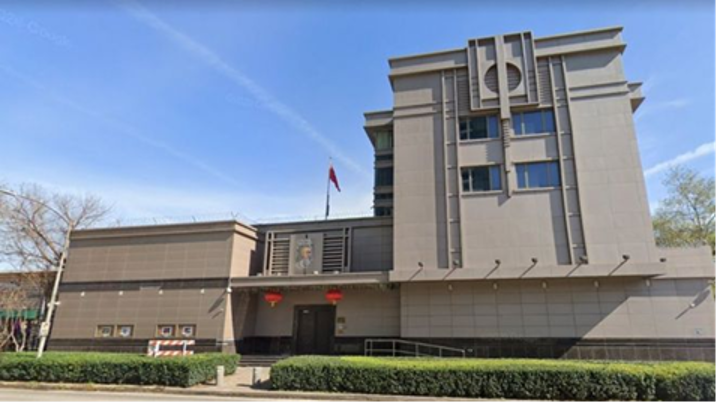
The U.S. government on Tuesday, July 21, 2020, abruptly asked China to close its Consulate General in the Texas City of Houston, Texas. Chinese Foreign Ministry spokesman WANG Wenbin said the decision was made unilaterally by the United States, which China “strongly condemned” and threatened to retaliate. This is the latest sign of escalating tensions between China and the U.S
Black smoke billowed from the Houston Consulate Tuesday night, local time, and nearby residents filmed people inside burning some documents
In an interview with The New York Times, David R. Stilwell, the State Department’s assistant secretary to the Secretary of the State for Asia and the Pacific, said that the Chinese consulate in Houston is a “headquarters” for China to develop students for spying, collect economic and military intelligence. (The above information is based on a BBC report.)
Since then the incident continued to ferment, more details are revealed to the American media, a Chinese female scientist named “TANG Juan” became the focus of public attention
Let’s start with the mainstream media coverage in the PRC.
Information 1
Roundup information from the website of Voice of America and report from China News Service (CNS, Chinanews.com):
The U.S. government repeatedly intimidated and questioned Chinese students studying in the United States, confiscated their personal electronic devices and even detained them without apparent reason because of their alleged military background.
The Federal Bureau of Investigation (FBI) on Tuesday accused a Chinese visiting scholar at Stanford University of "visa fraud" for concealing the status of active service soldiers. However, the scholar had already truthfully declared personal information when applying for a visa two years ago.China's Foreign Ministry has previously said that, this was a serious infringement of the legitimate rights of Chinese students studying in the US and a blatant political persecution.
The visiting scholar is SONG Chen, 38. She submitted a visa application in November 2018 and truthfully informed the US that she had served in the military from September 2000 to June 2011 and she claims she currently works for Xi Diaoyutai Hospital in Beijing.
In 2019, SONG Chen began her career as a visiting scholar in Neuroscience at Stanford University and extended her visit to Jan. 6, 2021.
She clarified that she has no connection with the Chinese Military.
The U.S. Attorney's Office for the Northern District of California reported on the 20th that SONG was arrested over the last weekend. Prosecutors have charged her with providing false documents to obtain a visa. The criminal complaint says she was employed by a hospital in the Chinese Air Force, and that she maintained ties to the Chinese Air Force after 2011.
The Prosecutors believed she was "a civilian officer" but was on active military duty. If convicted, SONG faces a maximum sentence of 10 years in prison and a fine of US$250,000.
In interviews with U.S. personnel this month, SONG has repeatedly stressed that she has no ties to the Chinese military since her graduation from the Fourth Military Medical University.
The FBI found in her biographical data given to Stanford University that she has mentioned in one of her articles that her employer was affiliated with the PLA Air Force or the Fourth Military Medical University, which the FBI therefore believed she way lying about her military background, but from start to finish, the U.S. prosecutors have not found real evidence that SONG is working for the Chinese military.
It’s believed that SONG is an expert in myasthenia gravis, a rare disorder that causes muscle weakness. A Stanford professor told an investigator that Song's research benefitted the work in his lab.
In June of this year, WANG Xin, a researcher from China at the University of California, San Francisco, was charged with similar crimes as SONG.
WANG Xin was taken into custody on June 7 at Los Angeles Airport as he was prepared to board a flight to Tianjin. He was charged with visa fraud by deliberately about lying his identity as an active PLA officer at the time of applying for a visa to the United States
Chinese Foreign Ministry spokeswoman HUA Chunying responded on June 12: "As far as I know, WANG Xin is only a doctor in the field of cardiovascular disease, and I don't see how he could jeopardize the U.S’ national interests or security.”
In addition to accusing Chinese scholars with unfounded charges, the US Customs has conducted extremely severe interrogations on the returning Chinese students, in some cases even outright confiscating many of their important electronic devices.
Recently, a PhD in nutrition who was in a government-sponsored program to study abroad at the University of California, San Francisco, said on her Weibo that, the U.S. Customs and the FBI indiscriminately and forcibly inspected and confiscated all of her electronic equipment, searched her WeChat chat history, and interrogated her about whether she was a "PLA" or a "Party member."
She unfortunately missed her flight because of the lengthy inductive interrogation process, in which she was repeatedly accused of "stealing advanced American technology and taking it back to China". The officials used directive words to coerce her confession.
Chinese students have been detained by the US Customs in the past, mostly because their majors are more sophisticated and sensitive, but now it seems that the US Customs does not need any reason to question the Chinese students.
In view of the excessive behavior of the U.S. side, the Department of Consular Affairs of the Ministry of Foreign Affairs of the People's Republic of China (MFA) issued a reminder to the Chinese students in the U.S. to raise their security awareness, step up precautions and take appropriate and preventative measures, and in case of emergency, contact the Chinese embassy or consulate in the U.S. for assistance.
Information 2
The Chinese Embassy in the U.S. intends to bring back foreign students to ChinaAccording to the website of the Chinese Embassy in the U.S.:
The Chinese Embassy in the U.S. announced that on May 21,
considering some Chinese students in the United States still have difficulties and in urgent need to return home, after back-and-forth consultations with the U.S. side, according to the deployment of the Chinese Ministry of Foreign Affairs, the Chinese embassy and consulate in the United States will continue to send temporary flights to pick up some students in difficult circumstances in the United States to return home.
The Chinese Embassy in the United States said it would register students online in accordance with the principle of fairness and justice, and would determine the list of returnees based on the registration, flight arrangements and other factors.
People eligible for flight registration are: the Chinese students themselves who have completed their studies in the U.S. (with F1, J1, or M visas); the teachers and volunteers of Confucius Institutes who ended their tenure; and those who possess Form I-20 (student visa) or Form DS-2019 (exchange visitor visa) that has expired or is about to expire.
The Embassy also warned that the United States still has entry restrictions on some countries and regions, and people may not be able to return to the United States in the near future. It is suggested that all factors such as the entry restrictions on the US side be taken into account, and that a careful assessment decision to be made.
Passengers on temporary flights are required to complete a Nucleic acid-based tests for the Coronavirus no later than five days prior to boarding and provide the test report to the airline at the time of check-in. Only passengers with negative test results will be allowed to board.
The Chinese Embassy and Consulates in the U.S. arranged two rounds of 32 temporary flights from April 11 to June 5, bringing back a total of about 7,000 students.
China's Ambassador to the United States CUI Tiankai pointed out in an interview with CCTV that the total number of Chinese students in the United States is over 400,000, and there are still tens of thousands of students who have finished their studies or whose visas have expired and in need to return home urgently.
In the first report, we know that the two visiting scholars sent by the Chinese Communists Party were arrested and interrogated by the FBI.
The charges are alleged lying about their actual identity as officers in the military and committing visa fraud. The two visiting scholars are:
SONG Chen (Song Chen, pronounced), is 38 years old. She submitted her visa application in November 2018. From 2019, SONG started as a visiting scholar at Stanford University’s Neurology department. Her visit is extended to January 6, 2021.
Wang Xin, a visiting scholar at the University of California, San Francisco, was arrested on June 7 at Los Angeles Airport as she was about to board a plane to Tianjin, China.
Another person under investigation during this period is "TANG Juan", who is closely associated with the CCP’s Houston Embassy, was not mentioned by the Chinese media and by the CCP officials.
The CCP uses the same tactics when presenting this kind of news, just like our previous excavation exposures (in Season 1 and Season 2). The CCP reported the death of ZHAO Yongfang, by changing the location of ZHAO's accidental death from the dormitories of the Chinese Academy of Sciences in Beijing to her "home in the United States. The purpose was to incite uninformed Chinese people’s hatred against the Americans by fabricating lies.
Why does the CCP hide the fact that "TANG Juan" is under investigation? This is the focus of our investigation in this report. There is another purpose to hide the TANG Juan facts in CCP’s 1st report – that is, the CCP is deliberately confusing and framing the U.S’ counter-attack on the CCP as attacking the Chinese people and all the 92 million communist party members. By doing so, the top CCP dictators can hide behind the 1.4 billion people and make it harder for the US to take actions against the very few at the top in particular. The CCP attempts to kidnap all Chinese people and the 92 million Communists party members in the next showdown.
Here are the three detailed descriptions about SONG Chen and WANG Xin’s charges according to the CCP: “We are told that these two ladies have been arrested, details should have come from the prosecutor's charging documents.”
But the CCP’s disclosure on the latter PhD who studies nutrition, about her experience at the US Customs before boarding the plane is worth pondering. All Chinese who have come to the U.S. to study or who have temporary visas to come to the U.S. know that under that current environment of the U.S.-China relations, this sort of questioning and related investigations will become the norm.
As an old saying “a straight foot is not afraid of a crooked shoe”, just follow the laws of the country and answer truthfully.
CCP claims: "Chinese students were detained by US Customs in the past, mostly because their majors were more sophisticated and sensitive, but now it seems that US Customs does not need any reason to question Chinese students.”
“The Department of Consular Affairs of the Ministry of Foreign Affairs of the People's Republic of China (MOFA) has issued a reminder to Chinese students in the U.S. to enhance their security awareness, step up precautions, and take appropriate and preventative measures, and in case of emergency, contact the Chinese embassy or consulate in the U.S. for assistance.”
The phrase "in case of emergency, contact the Chinese Embassy or Consulate in the United States for assistance" is no doubt a reminder to those who are guilty and have something to hide, be aware of the danger and learn how to respond. So the "TANG Juan" kind of incident is highly relevant to the CCP and she needs to contact the Chinese Embassy or Consulate in the United States for assistance in case of emergency.
Before analyzing and interpreting the second part of the report, let us first show the report of the American media:
[A court document submitted by the federal prosecutors show that a scientific researcher who concealed his true identity at a Chinese military medical university was hidden in the Chinese Consulate in San Francisco, California after being interviewed by the FBI on 20th June for his visa fraud.
The document filed at the Federal Court for the Northern District of California on 20th July stated that Tang Juan (transliteration) was engaged in research work at the University of California, Davis on a J-1 visiting scholar visa. She did not disclose her relationship with the Chinese People’s Liberation Army (PLA) at the time of applying the visa, investigation revealed that she works for the Air Force Military Medical University and is an active soldier.
Court documents show that after obtaining a search warrant, the FBI searched her home on 20th June and found evidence of her relationship with the People's Liberation Army. The FBI also questioned her that day. Tang Juan was charged with visa fraud on 26th June.
The prosecutor said that Tang Juan entered the Chinese Consulate in San Francisco some day after being searched and questioned. According to the assessment of the FBI, she remained there.
This court document is about another defendant in a visa fraud case with ties to the Chinese military, Song Chen. Song Chen was a J-1 visiting scholar at Stanford University, and the federal prosecutors accused her of concealing her existing relationship with the PLA Air Force General Hospital and the Fourth Military Medical University. Song Chen was arrested last weekend. Her lawyer requested the court to approve bail. In this document proposing to detain the defendant, the prosecutor mentioned other similar cases in which the PLA scientific research personnel concealed their true identity, including the Tang Juan case.
The Axios news website first noticed the case of Tang Juan who hides in the Chinese consulate, which was mentioned in this court document on July 22.
The case came to light as the United States ordered to close the Chinese Consulate in Houston. The closure of the consulate is a major escalation of tensions between the US and China.
On July 21, the United States ordered the Chinese consulate in Houston to close before noon on the 24th; the consulate personnel burned confidential documents overnight. China has threatened to take retaliatory measures.
US Secretary of State Pompeo, who was visiting Denmark, said on July 22 that the Houston consulate was closed because of China’s long-term theft of intellectual properties. President Trump has said “enough” for Beijing’s various actions.
The U.S. Deputy Secretary of State Biegun explained to the senators on the same day: " We find the U.S.-China relationship today weighed down by a growing number of disputes, including commercial espionage and intellectual property theft from American companies; unequal treatment of our diplomats, businesses, NGOs, and journalists by Chinese authorities; and abuse of the United States’ academic freedom and welcoming posture toward international students to steal sensitive technology and research from our universities in order to advance the PRC’s military. It is these factors which led the President to direct a number of actions in response, including yesterday’s notification to the PRC that we have withdrawn our consent for the PRC to operate its consulate in Houston, Texas."
The prosecutor pointed out that Song Chen stated in the visa application that she had served in the Chinese military from September 1, 2000 to June 30, 2011. Her current employer is "Beijing West Diaoyutai Hospital" and the address is "No. 30, Fucheng Road, Beijing, postcode 100142". Song Chen described her profession as a neurologist in the visa application and came to the United States to study brain diseases at Stanford University.
The prosecutors accused Song Chen that the information provided by her during the visa application was a lie, she was still an active member of the military when she entered the United States. The employer "Beijing West Diaoyutai Hospital" was just to cover her identity, and the address happened to be the PLA Air Force General Hospital.
Investigators discovered through Internet searches that Song Chen has close ties with the military's institutions. The FBI also pointed out that in 2018, Song Chen was listed as a co-author of a study on cerebral infarction in pilots affiliated with the Air Force General Hospital.
By searching the Internet one can see that Song Chen is an attending physician in the Department of Neurology of the Air Force General Hospital, who is good at diagnosis and treatment of myasthenia gravis.
Investigators also checked Song Chen’s external hard drive with a court search warrant and found that she explained to the Chinese Consulate in New York in a letter which was deleted on 21th June that her research in the US needs to be extended for a year, and the extension must go through the air force and the Fourth Military Medical University, the latter two have gave her permission to extend her visa, and the Beijing West Diaoyutai Hospital filled in by the employer in her visa application form is just a cover.
Earlier, Xin Wang, a researcher from China at the University of California, San Francisco, was arrested by US personnel when he was about to board a plane to Tianjin at Los Angeles International Airport on 7th June.
He was accused of deliberately concealing his status as an active military officer when applying for a visa to the United States, and was charged with visa fraud, with a maximum sentence of 10 years in prison and a fine of US$250,000.]
According to this report, we know some basic facts:
A Both SONG Chen and TANG Juan were investigated by the US’ FBI on suspicion of “visa fraud”. Both of them were related to the Chinese military before they went to the United States, and the same institution they are involved with was the Fourth Military Medical University. According to the article, the domestic employer and address filled by them during in the application are "Beijing Xidiaotai Hospital" and "30 Fucheng Road, Beijing, postcode 100142". After the investigation, SONG Chen was arrested, while TANG Juan hid in the CCP consulate in San Francisco.
B On July 21st, the United States ordered the Chinese Consulate in Houston to close before noon on the 24th. Note that it was announced on July 21st and the closing time should be before noon on the 24th (about 72 hours). Then on the evening of July 21st, the Chinese consulate in Houston burned many unknown items. The report explained the reasons for the US government to close the consulate.
This report and the aforementioned Chinese report clearly stated the following:
A The US’ FBI has conducted investigations of the Chinese consulate as an core organization which is involved in commercial espionage and intellectual property theft against the US companies for a long time and has a large amount of evidence to prove that.
B. The investigation of TANG Juan and others was made on the basis of accurate intelligence, and further investigation and judicial prosecution were carried out in the name of suspected "visa fraud."
C. TANG Juan’s avoidance of arrest and entering the consulate show that she adopted an emergency response pursuant to the Consulate’s alert in order to avoid further investigation measures. It also proves that TANG Juan is not an ordinary visiting scholar and has a relationship with the Chinese consulate in the United States, or one can say that the United States government used the FBI's investigations, arrests and prosecutions to "stir the grass and startle the snake." The fact shows that the snake was indeed startled.
D. The reason why the Houston Consulate is closed instead of the San Francisco consulate is because the fact that TANG Juan fled into the San Francisco consulate would make the American people and people around the world to see the true color of the CCP consulate. Further, the fact that the Houston Consulate staff burned many things overnight proves the rationality of the US government's closure of the Chinese consulate. So this is (a part of) a combination of punches the US government has aimed at the CCP.
It can be said that the ‘grass stirring’ act this time has really shocked the ‘the CCP –a poison snake’ to the point of panic. Therefore, "The Chinese Embassy in the United States announced on the 21st: considering that there are still some Chinese students studying in the United States who face real difficulties and urgently need to return to China, after repeated negotiations with the United States, according to the deployment of the Chinese Ministry of Foreign Affairs, the embassy in the United States will continue to send temporary flights to pick up some of the students who are in difficulties in the United States to return home."
How to comprehend this message? This message of picking up Chinese students is not for the 400,000 ordinary students who are studying in the United States, but for the special people like "TANG Juan". First it made clear that this is a state-arranged pick-up task, which is deployed by the Ministry of Foreign Affairs and the embassy in the United States by means of temporary flights. "Difficulties in the US", what kind of difficulty is it? It is definitely not the financial difficulties caused by the epidemic. It refers to the relevant personnel who have been investigated by the relevant US departments or may be investigated by the relevant US departments in the future. It clearly stated that “an online registration of overseas students will be carried out, and the return list will be determined according to the registration conditions, flight arrangements, and other factors.” This message is actually equivalent to notifying the spies in the intelligence work, people on the special front, (inform them to) register quickly, and run, before it is too late!
However, have these people having ulterior motive ran away? With the U.S. government's announcement of the closure of the CCP's consulate in Houston, they have only one way out, which is to voluntarily surrender to the FBI, the U.S. investigation department, and to reveal the CCP's criminal activities. The logic here is very simple. Either stay silent and wait for the FBI's investigation, or escape into the consulate like TANG Juan. Whether they register online for flights back home or escape into the consulate, their true identities will be exposed.
Then, we have to dig further into TANG Juan. We already know that she is a very important figure, so important that she can risk and expose herself to the CCP consulate to avoid the FBI’s arrest.
2.Who is Tang Juan?
We complete the portrait of TANG Juan based on the information found on the Internet:TANG Juan, before going to the United States as a visiting scholar, worked in the School of Fundamental Medicine, Air Force Military Medical University (Fourth Military Medical University), the Cell Engineering Research Center of the Fourth Military Medical University, the Department of Cell Biology, the State Key Laboratory of Tumor Biology, as an associate researcher and a master tutor.
Her doctoral supervisor is Academician CHEN Zhinan (Chinese Academy of Engineering).
The "Beijing Xi Diaoyutai Hospital" filled in her visitor visa application to the United States in 2019 does not exist. Beijing only has "Beijing Diaoyutai Hospital" addressed at "Beijing Dongcheng District", whist the address she filled on her visa application is "Beijing Fucheng Road No.30", which is the mailing address of the Air Force General Hospital.
The following is a more detailed introduction of TANG Juan:
[Tang Juan, associate researcher at the National Molecular Medicine Translational Center of Air Force Military Medical University, has long been engaged in fundamental tumor and translational research, and has presided over one national "Twelfth Five-Year" 863 project, two national science and technology major special projects, and one military key project. Three National Science Fund projects. Published 25 papers as the first author and the corresponding author. She won the Shaanxi Provincial Science and Technology Rising Star, Chinese Pharmaceutical Association Sanofi Young Biopharmaceutical Award, Shaanxi Province Sanqin Talent Allowance, Military Outstanding Professional Technical Talent Post Allowance, First Prize of Youth Outstanding Paper in 2014 Annual Meeting of Chinese Society of Cell Engineering, first prize of the Chinese Cell Biology Society's Outstanding Paper Award, and the Young Outstanding Paper Award of the 8th International Conference on Frontiers of Life Sciences.]
In our "P4 Labs Season 2", we have already introduced military civilians. Simply put, TANG Juan is a military civilian, a real active soldier.
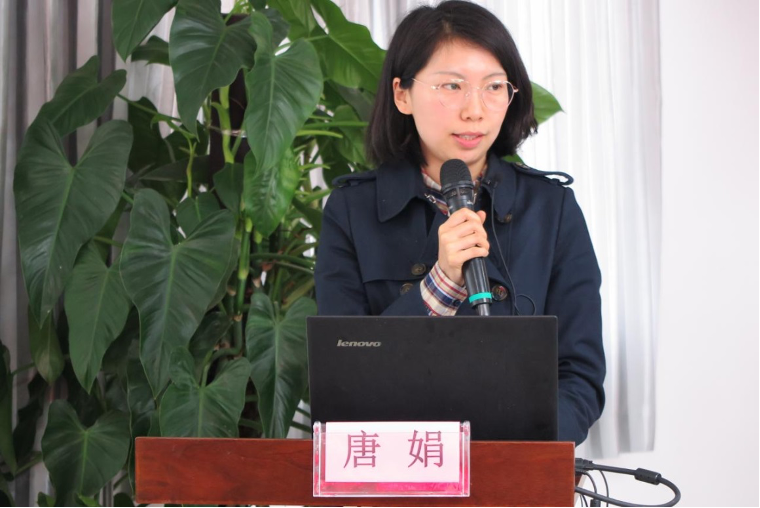
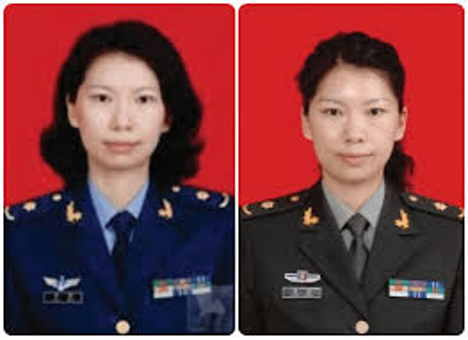
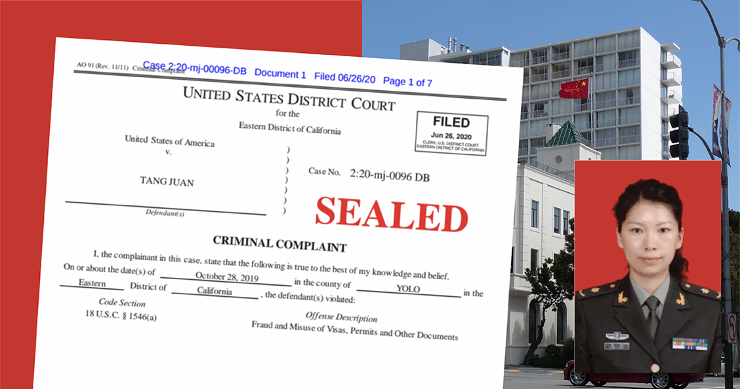
There is also a famous figure in this university - GAO Yanyan, whom we revealed in the Season 1 that she might be the mother of "WANG Yanyi" whose father might be the CCP’s No.2 man WANG Qishan.
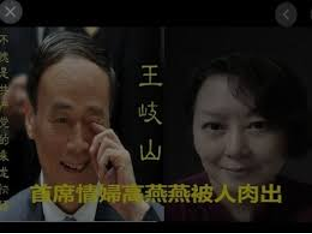
In 1959, it was designated by the central government as one of the first batch of 20 key universities in the country.
In 1995, it became a key military academy.
In 1997, it became one of the first 22 batches of the "211 Projects" key construction colleges in the country.
In 1999, the Chinese People's Liberation Army Dalian Medical College was merged into the Forth Military Medical University
In 1999, the Chinese People's Liberation Army Air Force Medical College was merged in, it became Jilin Military Medical College of the Fourth Military Medical University, under the organizational system of the General Logistics Department. In July 1999, the handover and unveiling ceremony was held at the Jilin Military Medical College of the Fourth Military Medical University. In 2004, the Jilin Military Medical College of the Fourth Military Medical University (formerly the college part of the Air Force Medical University) was separated and transferred to the local (government) to establish the Jilin Institute of Medicine.
In 2005, Bethune's Military Medical College has merged in. In 2011, Bethune Military Medical College became independent as the Chinese People's Liberation Army Bethune Medical Noncommissioned School.
In 2016, in deepening the reform of national defense and the army, the Fourth Military Medical University was transferred from the General Logistics Department of the Chinese People's Liberation Army to the Training Management Department of the Central Military Commission.
In 2017, in deepening the reform of national defense and the military, the Fourth Military Medical University was transferred to the Chinese People’s Liberation Army Air Force and renamed as the Chinese People’s Liberation Army Air Force Military Medical University. It is also known as the Fourth Military Medical University of the Chinese People's Liberation Army. On July 21st, 2017, the inaugural meeting of the Chinese People’s Liberation Army Air Force Military Medical University was held in Xi’an. The Air Force political commissar YU Zhongfu awarded the Chinese People’s Liberation Army flag to the school’s president ZHOU Xianzhi and political commissar JI Zhihong.]
Note that the Fourth Military Medical University was affiliated to the General Logistics Department before 2016, and was affiliated to the Chinese People’s Liberation Army Air Force after 2017.
The clinical hospitals related to and affiliated with the Fourth Military Medical University mainly include: Xijing Hospital, the First Affiliated Hospital of PLA Air Force Military Medical University; Tangdu Hospital, the Second Affiliated Hospital of PLA Air Force Military Medical University; Air Force General Hospital in Beijing, that is, the hospital at the address of No. 30 Fucheng Road (Xi Diaoyutai), Haidian District mentioned above, so the address is a (legitimate) address. Of course, they can quibble that they don't know Beijing, and their call of the address "Xidiaoyutai" as the name of the hospital is a mistake. To that, we can only say, well, if you say so…
One of Tang Juan’s most famous academic papers is as follows:
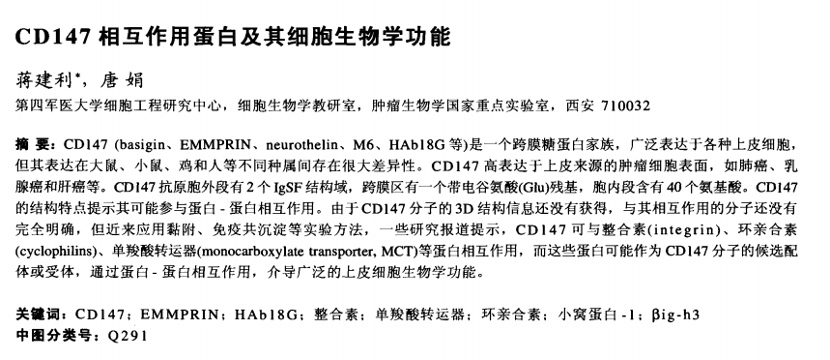
Jiang Jianli, Tang Juan
Cell Engineering Research Center of Fourth Military Medical University, Office of Cell Biology, National Key Laboratory of Tumor Biology, Xi’an, 710032
In this paper, there is a key term, CD147. This name is highly related to the CCP virus we have been digging so far. Folks, have you astonished to cold sweat when seeing this? Of course, without the interpretation of our righteous scientist, ordinary people would not have discovered this point.
3.The relationship between CD147 and CCP virus
Before our righteous scientist interprets the relationship between CD147 and CCP virus, let’s read an article published in China.
Material 1
Breaking! Academician Chen Zhinan of the Fourth Military Medical University discovered a second route of new coronavirus invasionMar. 16, 2020 iNature
Original title: Breaking \| Academician Chen Zhinan of the Fourth Military Medical University discovered a second route of new coronavirus invasion, having great significance in treatment and drug development.
Due to the rapid increase in new cases, the 2019 Coronavirus Disease (COVID-19) quickly attracted global attention. The new coronavirus infection is believed to be transmitted from animals. As of January 2020, it is suspected that the initially patients were infected with the virus through human-to-human transmission. Since January 2020, COVID-19 viruses have escalated, and the virus has rapidly spread to most parts of China and other countries. As of March 9, 2020, China has reported 80,735 confirmed COVID-19 cases and 3,119 deaths. These figures are updated every day and are expected to increase further. The interaction of S protein and ACE2 promotes the SARS-CoV invasion into host cells. The structure of SARS-CoV-2 S protein is highly similar to that of SARS-CoV S protein, and SARS-CoV-2 S protein binds to ACE2 with a higher affinity than SARS-CoV S protein, indicating that SAR-CoV-2 has stronger invasion ability. In addition to ACE2, other receptors bound by S protein on the host cell membrane are still unclear.
On March 14, 2020, Chen Zhinan, ZHU Ping and Bian Huijie, from the Fourth Military Medical University, together published on an online preprint platform bioRxiv a non-peer-reviewed research paper titled "SARS-CoV-2 invades host cells via a novel route: CD147 -spike protein". The study found that SARS-CoV-2 invaded host cells through a new way of CD147: S protein binds to the receptor CD147 on the host cell to mediate virus invasion. Therefore, the discovery of the new route CD147-S Protein for SARS-CoV-2 invading host cells provides a critical target for development of specific antiviral drugs.
In December 2019, a group of patients with pneumonia of unknown cause were confirmed to have been infected with a new type of coronavirus, 2019-nCoV, in Wuhan, Hubei Province, China, which has not been found in humans or animals before. Epidemiological evidence suggests that most of these patients have been to the local seafood market in Wuhan, and the genetic sequence of the virus obtained from these patients is highly similar to that identified in bats. Because of the similarity, the virus was subsequently renamed SARS-Cov-2, which is a member of the Sarbecovirus subspecies (Beta-CoV lineage B). Some researchers have found that SARS-Cov-2 has a strong affinity to human respiratory receptors, implying a potential threat to global public health.
Due to the rapid increase in new cases, the 2019 Coronavirus Disease (COVID-19) quickly attracted global attention. The new coronavirus infection is believed to be transmitted from animals. As of January 2020, it is suspected that the initially patients were infected with the virus through human-to-human transmission. Since January 2020, COVID-19 viruses have escalated, and the virus has rapidly spread to most parts of China and other countries. As of March 9, 2020, China has reported 80,735 confirmed COVID-19 cases and 3,119 deaths. These figures are updated every day and are expected to increase further. In addition, more than 40 countries or regions around the world have also seen new cases of COVID-19.
According to reports, the coronavirus is a non-segmented positive sense RNA virus, which mainly causes animal infections in birds and mammals, and has proven to be lethal to humans. These viruses are known to have four structural proteins, including E, M, N and S proteins. The main determinant of coronavirus infectivity is the S protein, which binds to the membrane receptor on the host cell and mediates the fusion of the virus and the cell membrane. Angiotensin-converting enzyme 2 (ACE2) is a homolog of ACE and one of the important receptors on the cell membrane of host cells. The interaction of S protein and ACE2 promotes the SARS-CoV invasion of host cells. The structure of SARS-CoV-2 S protein is highly similar to that of SARS-CoV S protein, and SARS-CoV-2 S protein binds to ACE2 with a higher affinity than SARS-CoV S protein, indicating that SAR-CoV-2 has stronger invasion ability. In addition to ACE2, other receptors bound by S protein on the host cell membrane are still unclear.
CD147, also known as Basigin or EMMPRIN, is a transmembrane glycoprotein that belongs to the immunoglobulin superfamily and is related to tumor occurrence, Plasmodium invasion and viral infection. Previous studies have shown that CD147 plays a functional role in promoting SARS-CoV to invade host cells, while CD147-antagonist peptide 9 has a high binding rate to HEK293 cells and has an inhibitory effect on SARS-CoV. These studies confirmed the importance of CD147 in virus infection of host cells. As SARS-CoV and SARS-CoV-2 have similar characteristics, the purpose of this study is to explore the possible function of CD147 in SARS-CoV-2’s invasion of host cells.
The study found that SARS-CoV-2 invades host cells through a new route via CD147: S protein binds to the receptor CD147 on host cells, thereby mediating virus invasion.
First, the in vitro antiviral test showed that the anti-CD147 humanized antibody Meplazumab can significantly inhibit the virus from invading host cells with an EC50 of 24.86μg/mL and an IC50 of 15.16μg/mL; secondly, the study ELISA also confirmed the combination of these two proteins; finally, the localization of CD147 and S protein in Vero E6 cells infected with SARS-CoV-2 was observed by immuno-electron microscope. Therefore, the discovery of the new route CD147-S Protein for SARS-CoV-2 invading host cells provides a critical target for development of specific antiviral drugs.
参考消息:https://www.biorxiv.org/content/10.1101/2020.03.14.988345v1】 (Reference)
Material 2
The team of Academician Chen Zhinan, vice chairman of the Chinese Pharmaceutical Association, found that meplizumab can treat new coronavirus pneumoniaMar. 26, 2020
Due to the rapid increase in new cases, the novel coronavirus pneumonia (COVID-19) (hereinafter referred to as COVID-19) quickly attracted global attention. The new type of coronavirus (SARS-CoV-2) is believed to have spread from animals. By January 2020, it is suspected that the initial patients with new coronavirus pneumonia were infected through human-to-human transmission. Since January 2020, the virus has rapidly spread to most parts of our country and other countries.
As of March 24, 2020, 332,930 cases of new coronary pneumonia have been confirmed and 14,510 deaths have been reported globally. These figures are updated every day and are expected to increase further. Previous studies have shown that the new coronavirus invades host cells through a new way of CD147: S protein binds to the receptor CD147 on the host cell to mediate the virus invasion. Anti-CD147 antibodies can prevent the infection of the new coronavirus. Until now, there is no specific antiviral drug.
On March 24, 2020, Chen Zhinan, ZHU Ping, Bian Huijie, and Lian Jianqi, from Air Force Military Medical University, jointly published on a pre-printed platform medRxiv a non-peer-reviewed research paper titled "Meplazumab treats COVID-19 pneumonia: an open-labelled, concurrent controlled add-on clinical trial". The study found that the anti-CD147 humanized antibody meplazumab is safe and effective in the treatment of patients with new coronary pneumonia. The results of this study support large-scale clinical research on meplizumab as a drug for the treatment of new coronavirus pneumonia.
These two reports actually say one thing, that a scientist has discovered something that can treat novel coronavirus pneumonia. Let's not rejoice too soon for our readers to think that an antidote to the CCP virus has emerged. Let's look at some basic facts first: the main discoverer was Aademician CHEN Zhinan and his team at the Fourth Military Medical University, and the discovery was the result of research on CD 147 antibodies, which is referred by TANG Juan in her thesis. Note that CHEN Zhinan is TANG Juan's PhD supervisor.
It could be argued that Tang Juan's escape and surfacing gave our justice scientists an extremely important clue about CD147 and its related research.
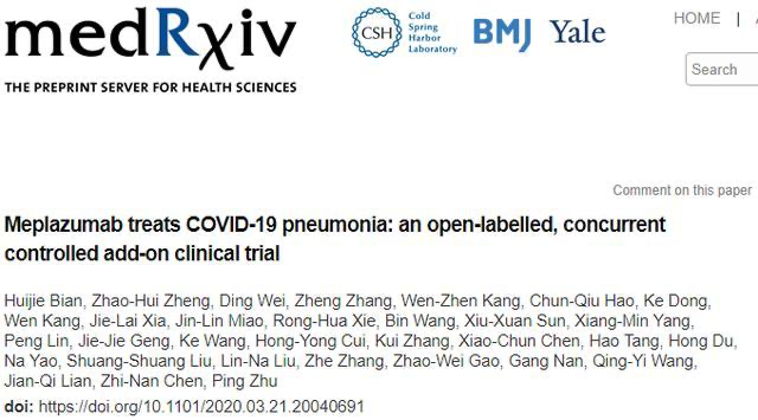
CD147, also known as Basigin or EMMPRIN, is a trans membrane glycoprotein that belongs to the immunoglobulin superfamily and is associated with tumor genesis, malaria parasite invasion, and viral infection. Previous studies have shown that CD147 plays a functional role in promoting coronavirus invasion of host cells, while CD147-antagonist peptide 9 binds to HEK293 cells at high rates and inhibits coronavirus. These studies confirmed the importance of CD147 in viral invasion of host cells. Previous studies have shown that novel coronaviruses invade host cells through a novel pathway of CD147: S protein binds to the receptor CD147 on host cells, thereby mediating viral invasion, and anti-CD147 antibodies prevent infection by novel coronaviruses. Until now, no specific antiviral drugs have been available. This study evaluates the efficacy and safety of meplazumab, a humanized anti-CD147 antibody, as an add-on therapy for patients with novel coronavirus infection.
In the study, all patients received the recommended strategy published by the National Health Commission of China, "Diagnosis and Treatment of Novel Coronary Viral Diseases 2019". Eligible patients received an additional intravenous infusion of 10 mg meplazumab on days 1, 2, and 5, which served as a concurrent control with patients who were hospitalized during the same period. Endpoints included virological clearance, case severity, chest radiographs and laboratory tests. The trial has been approved by the ethics committee of the Tangdu Hospital and is registered with ClinicalTrials.gov under registration number NCT04275245.
The study recruited 28 patients, of which, 17 were assigned to the meplazumab group and 11 inpatients served as controls. The meplazumab group significantly improved discharge rates and disease severity among critically and severely ill patients compared to the control group. Time to virus negativity was reduced in the meplazumab group compared to the control group (median 3 vs 13). The percentage of patients who returned to normal lymphocyte counts and CRP concentrations was also significantly faster in the meplazumab group. No adverse effects were observed in patients treated with meplazumab.
Meplazumab was effective in improving the recovery of patients with neo-coronary pneumonia and had a favorable safety profile. The results of this study support a large-scale clinical study of meplazumab as a treatment for novel coronavirus pneumonia.
CD147 is a trans membrane protein, and CHEN Zhinan, TANG Juan's supervisor, is an expert on this protein. As we can see from the published paper search, although TANG is now an associate professor, she has been working closely with CHEN, and her research has been related to CD147 since she was a graduate student until now. In the figure below, we have compiled the English papers published by TANG Juan and CHEN ZhiNan, who have been co-publishing from 2006 to 2020.
So what does CD147 have to do with the CCP virus? From the information above on Part 1, CHEN's lab first reported that CD147 may help the CCP virus to invade cells. As we all know, the CCP virus requires the binding of S protein and the cell surface receptor ACE-2 to invade cells. In addition to ACE-2, CHEN's research suggests that CD147 may also be a surface receptor of the CCP virus, which is another key for the virus to open cells. In other words, CD147 can help the virus to infect cells. CHEN's and TANG's research is directly related to the infection mechanism of the China’s Communist Party virus.
Regardless whether their finding is true or not, we can see from the second article that the antibodies of CD147 have some inhibitory effect on the virus and may be a candidate for an antidote. But what exactly is TANG Juan's purpose for coming to the US lab, as a Chinese military officer with a relevant research background, and using a fraudulent visa? As a military man, CHEN is now working on the antidote to the CCP virus. TANG has such a close working relationship with CHEN Zhinan, her purpose as a visiting scholar in an American university laboratory is very suspicious at this time. The antidote to the virus is what the CCP wants the most, and once it is in PLA’s possession, it will be able to pre-empt the attack and threaten the world. Therefore, TANG hid her true identity and faked her way into the U.S., and was targeted by FB1, which is probably related to the theft of U.S. vaccine or antibody technology or resources.
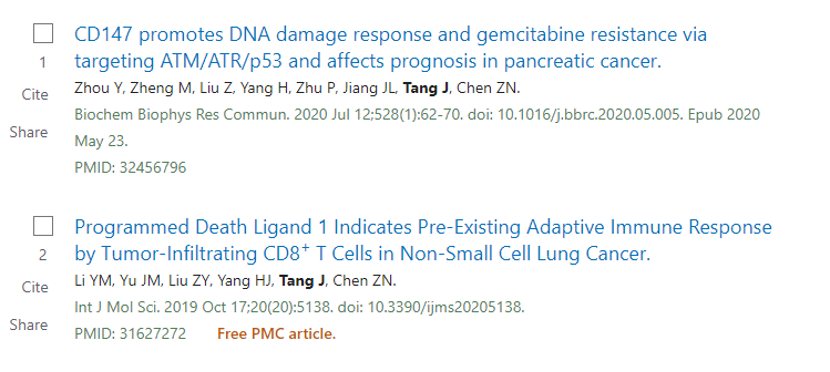
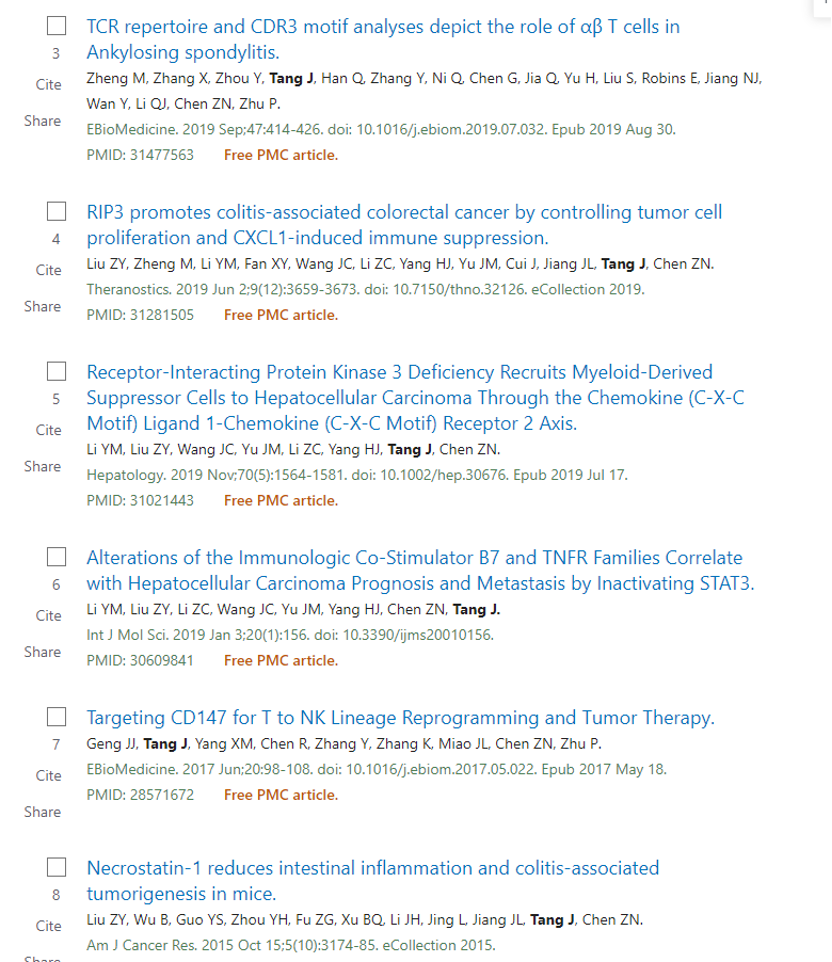
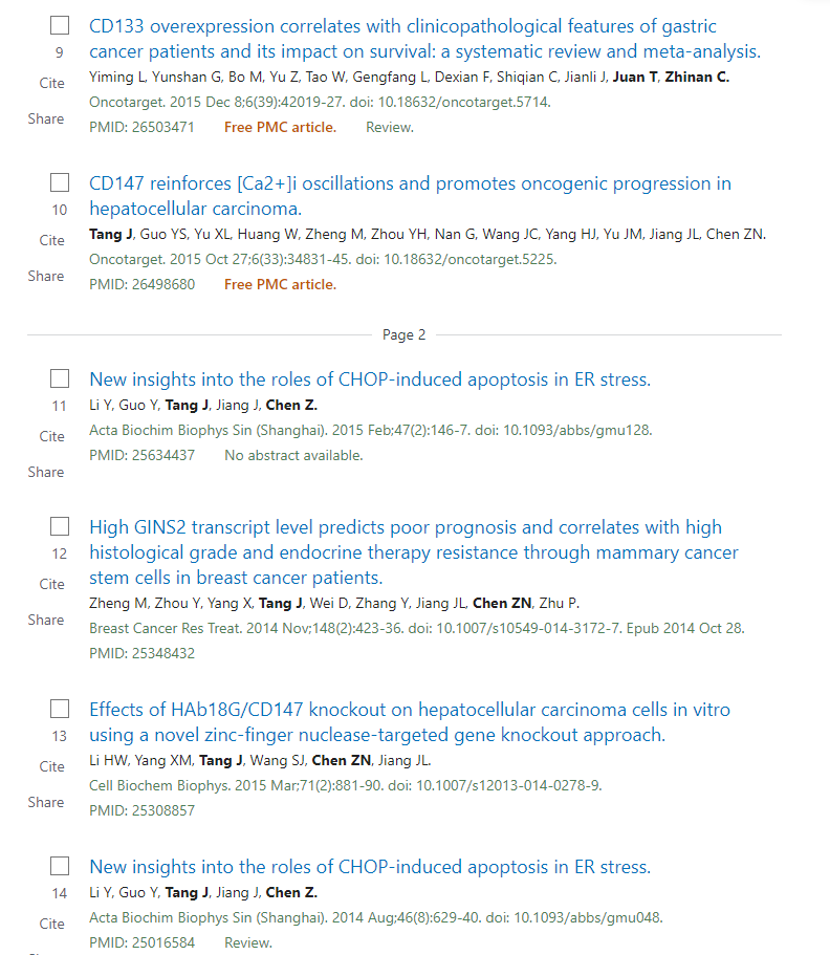
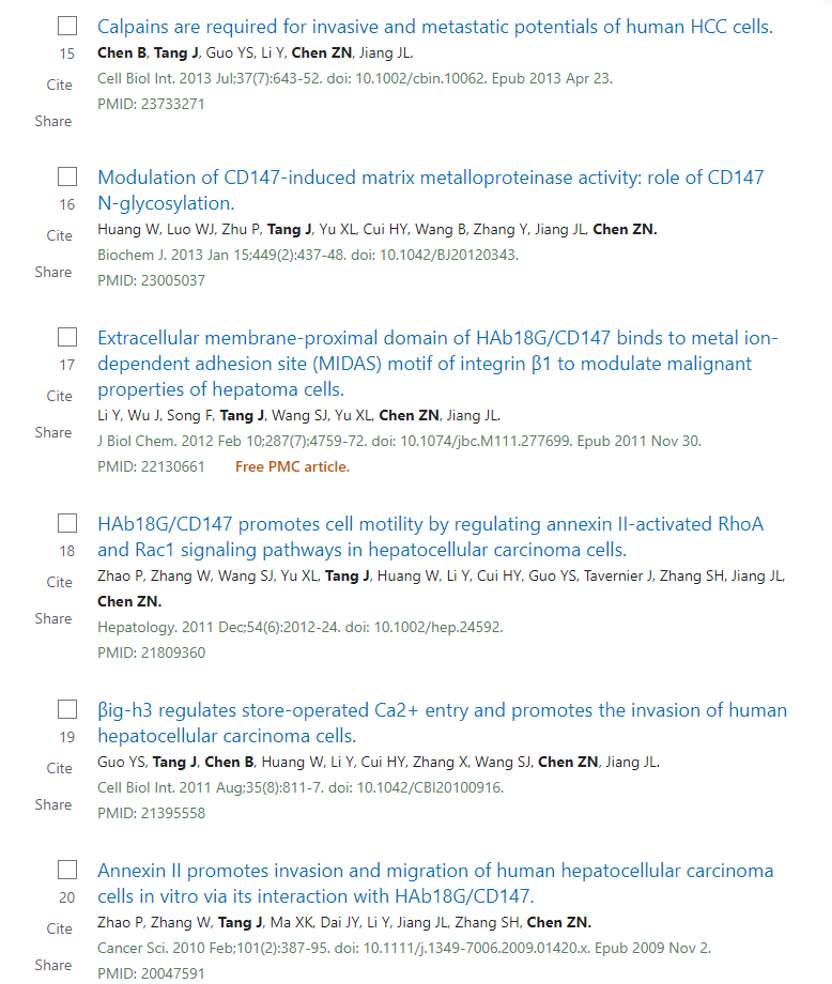
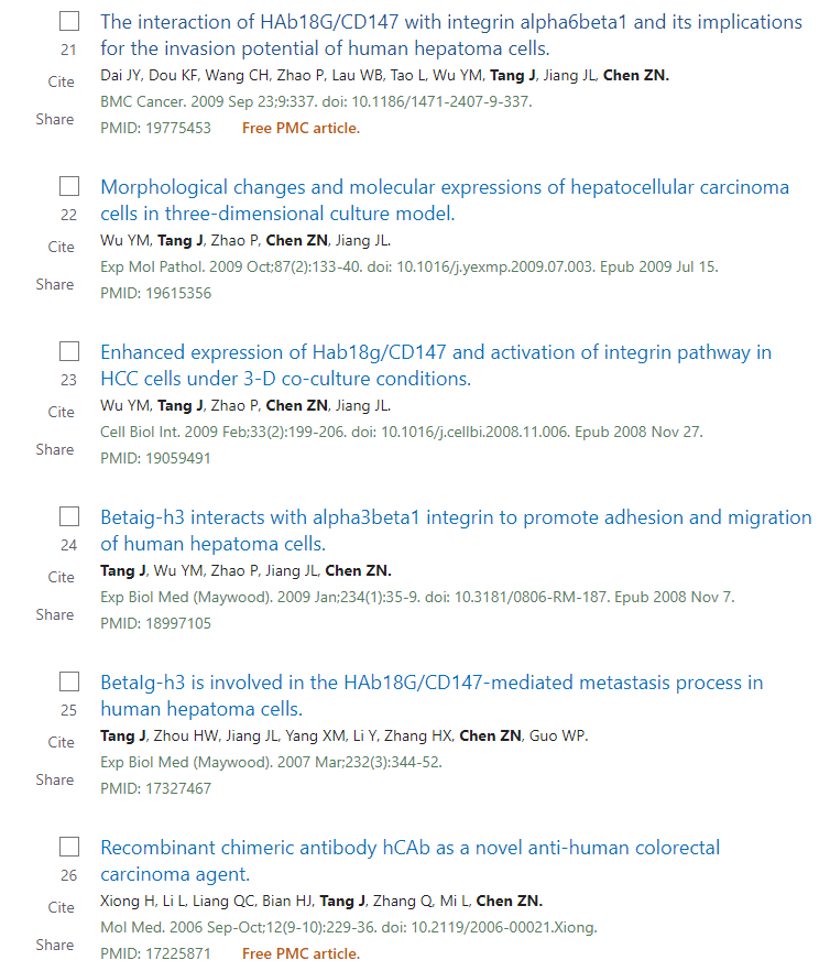
At this point, the antidote development team and the virus proliferation team of the CCP virus biochemical weapon development team that we revealed in season 2 have finally been revealed, and the clues that have been revealed are TANG Juan's military status and her mentor, CHEN ZhiNan. What we had dug up in season 2 was that, if this was a top secret program, the executioner of this program had to be the military. Of course, this military is not the formal military model that we think of, but it is disguised by layers of secrecy and packaged as various national projects and normal academic research and technical exchange activities. But one thing is hard to hide, and that is the professional military personnel, or you can call it civilian military personnel, are the main force hosting and participating in the research and development of this CCP virus. According to Miles GUO’s explosive revelation, this TANG Juan is also an officer in the Chemical Defense Force, so here's a question: why is Miles GUO’s revelation so important? The key point is, it proves that TANG Juan and the people and organization implicated behind her were involved in the entire process of developing and spreading the biochemical weapons of the CCP virus, and that the Chemical Defense Force was the key military unit that carried out the spread of the virus.
Of course the Chemical Defense Force also has the important task of taking control of the antidote to the viral weapon, primarily the antidote rather than the vaccine. Let's summarize everything into 3 key points about the virus: A, the army develops it, B, the army has the antidote, and C, the army releases the virus.
If this is not a biological war against America, what is!!! What more evidence is needed!
So far, the PLA Academy of Military Sciences, the PLA Academy of Military Medical Sciences, the PLA College of Chemical Defense, the First Military Medical University, the Fourth Military Medical University, and the General Staff Protection Department all appear in the list of participants from what we have dug up.
This article is a "takeaway" because it's a breaking story, and we'll be working on more detailed excavations and interpretations in the third season.
Anyway, everything has already begun!
End of article.